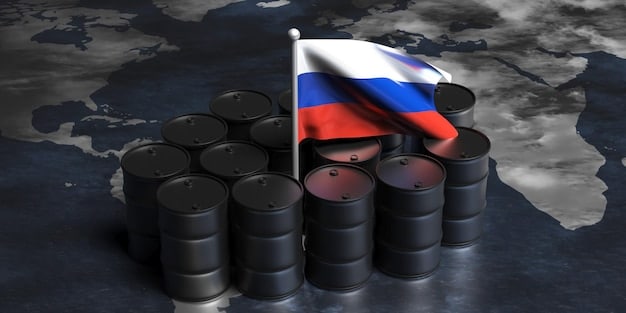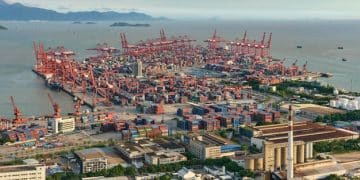US Foreign Policy & Russia Sanctions: Impact on Global Energy

The recent shift in US foreign policy, marked by new sanctions on Russia, is poised to significantly impact global energy markets, potentially leading to price volatility, supply chain disruptions, and altered geopolitical dynamics.
The United States’ foreign policy has taken a notable turn with the implementation of new sanctions targeting Russia. The reverberations of these sanctions are expected to heavily influence global energy markets. How will this unfold?
US Sanctions on Russia: A Policy Overview
The United States has historically employed sanctions as a tool of foreign policy to influence the behavior of other nations. The recent increase in sanctions against Russia represents a significant escalation, driven by various geopolitical considerations. Understanding the nature and objectives of these sanctions is crucial for assessing their potential impact on global energy markets.
These sanctions are designed to target key sectors of the Russian economy, with a particular focus on energy. By restricting access to Western technology and financial markets, the US aims to constrain Russia’s ability to develop new energy projects and maintain existing production levels. What specific measures are in place?
Key Sanction Measures
Several key sanction measures are at the forefront of this policy shift. These are impacting Russia’s ability to operate in the global energy market.
- Financial Restrictions: Limiting Russian entities’ access to US financial markets and the US dollar.
- Technology Export Bans: Preventing the export of advanced energy technology to Russia, hindering its ability to develop new oil and gas fields.
- Project-Specific Sanctions: Targeting specific energy projects, such as pipelines and offshore drilling ventures.
The intended consequence of these measures is to reduce Russia’s revenue from energy exports, thereby diminishing its capacity to fund activities that run counter to US foreign policy objectives. This is having noticeable results across the Russian economy.

Impact on Global Oil Supply
The sanctions imposed on Russia have a direct and significant impact on the global oil supply. Russia is one of the world’s largest oil producers and exporters, and any disruption to its production or export capacity can have far-reaching consequences for global energy markets. What ripple effects are we seeing?
One of the immediate effects of the sanctions is an increase in price volatility. As the market anticipates potential supply disruptions, traders react by bidding up prices, leading to fluctuations that can impact consumers and businesses worldwide. Here are some of the factors contributing to this volatility:
- Reduced Production: Sanctions limit Russia’s ability to invest in new oil fields and maintain existing ones, leading to a potential decline in production.
- Disrupted Exports: Restrictions on financial transactions and technology can hinder Russia’s ability to export oil to international markets.
- Geopolitical Tensions: The sanctions exacerbate existing geopolitical tensions, further fueling uncertainty and price swings.
The decreased supply from Russia has necessitated other countries to increase their production to meet global demand. This has led to some suppliers struggling to meet demand.
Natural Gas Market Disruptions
Beyond oil, the sanctions also have a profound impact on the global natural gas market. Russia is a major supplier of natural gas to Europe, and any disruption to its exports can have serious consequences for the continent’s energy security. This has had major impacts across Europe.
The sanctions have led to increased uncertainty about the reliability of Russian gas supplies. European countries, heavily reliant on Russian gas, are now scrambling to find alternative sources, which has driven up prices and created a sense of urgency in diversifying energy sources. What are the key challenges?
Challenges in the Natural Gas Market
The natural gas market faces several unique challenges that compound the effects of the sanctions. These are specific to natural gas markets.
- Infrastructure Limitations: Limited pipeline capacity and LNG import terminals restrict Europe’s ability to quickly replace Russian gas supplies.
- Long-Term Contracts: Many European countries have long-term gas supply contracts with Russia, making it difficult to switch suppliers in the short term.
- Geopolitical Risk: The reliance on a single dominant supplier creates geopolitical risks, as Russia can use its gas leverage to exert political influence.
These challenges highlight the need for a comprehensive strategy to diversify energy sources and reduce dependence on Russian gas. Many countries are now exploring alternatives to Russian gas supplies.

Alternative Energy Sources and the Shift
The US sanctions on Russia are accelerating the global transition towards alternative energy sources. As countries seek to reduce their dependence on Russian oil and gas, they are increasingly turning to renewable energy technologies and other alternatives. This is hastening the shift to sustainable energy sources.
Investments in renewable energy projects, such as solar, wind, and hydropower, are surging as countries look for ways to diversify their energy mix and enhance energy security. This shift is not only driven by geopolitical considerations but also by the growing recognition of the environmental benefits of renewable energy. What new technologies are emerging?
Emerging Technologies in Alternative Energy
Several emerging technologies are playing a crucial role in the transition to alternative energy. These technologies are transforming the energy landscape.
- Battery Storage: Advanced battery storage systems are enabling the integration of intermittent renewable energy sources into the grid, improving reliability and reducing dependence on fossil fuels.
- Green Hydrogen: Green hydrogen, produced from renewable energy sources, is emerging as a promising alternative fuel for transportation and industrial processes.
- Carbon Capture: Carbon capture technologies are being developed to capture CO2 emissions from power plants and industrial facilities, reducing their environmental impact.
These technologies are critical for enabling a smooth and sustainable transition to a cleaner energy future. In many areas, these new technologies are achieving cost parity with fossil fuels.
Geopolitical Realignments and Energy Security
The US sanctions on Russia are prompting significant geopolitical realignments as countries reassess their energy security strategies. Nations are forging new partnerships and alliances to ensure access to reliable and affordable energy supplies. This is impacting established geopolitical norms.
European countries are working to diversify their gas supplies by importing LNG from the United States, Qatar, and other sources. Meanwhile, Asian countries are seeking to strengthen energy ties with Middle Eastern producers and explore opportunities for regional energy cooperation. Here are some examples of ongoing realignments:
- US-Europe LNG Partnership: The United States is increasing its LNG exports to Europe to help reduce the continent’s dependence on Russian gas.
- Middle East-Asia Energy Cooperation: Middle Eastern producers are strengthening their ties with Asian consumers, ensuring long-term access to key markets.
- Regional Energy Grids: Countries are exploring the development of regional energy grids to facilitate the sharing of renewable energy resources and improve energy security.
These realignments reflect a broader trend towards greater energy independence and diversification, reducing the vulnerability to geopolitical disruptions. International cooperation is now more critical than ever before.
Long-Term Implications for US Foreign Policy
The shift in US foreign policy towards sanctions on Russia has significant long-term implications for both the United States and the global energy landscape. These implications extend beyond the immediate economic effects and touch upon broader geopolitical and strategic considerations. What future challenges and considerations exist?
One of the key implications is the potential for increased tensions between the US and Russia. The sanctions are likely to exacerbate existing disagreements and create new points of friction, making it more difficult to find common ground on other issues. Additionally, the sanctions may prompt Russia to seek closer ties with other countries, such as China, further complicating the geopolitical landscape.
Future Challenges and Considerations
Looking ahead, the US faces several challenges and considerations in implementing its sanctions policy. These require careful attention and strategic planning.
- Balancing Economic Interests: The US must carefully balance the need to impose sanctions with the potential impact on its own economy and the economies of its allies.
- International Cooperation: The effectiveness of the sanctions depends on the willingness of other countries to support and enforce them.
- Adaptability: The US must be prepared to adapt its sanctions policy in response to changing circumstances and new developments in the global energy market.
Addressing these challenges will require a nuanced and strategic approach, ensuring that the sanctions achieve their intended objectives without creating unintended consequences. The evolving geopolitical landscape demands constant evaluation and adaptation of policy.
| Key Point | Brief Description |
|---|---|
| ⚠️ Oil Supply Impact | Sanctions reduce Russian oil production and disrupt exports, causing price volatility. |
| 🔥 Gas Market Issues | Europe seeks alternatives amid uncertainty in Russian gas supplies and infrastructure limitations. |
| ⚡️ Renewable Shift | Investments surge in solar, wind, and hydropower for energy security and environmental benefits. |
| 🤝 Geopolitical Changes | Nations form new partnerships for energy access, reducing reliance on any single supplier. |
Frequently Asked Questions
▼
The primary goals include limiting Russia’s revenue from energy exports, constraining its ability to finance activities against US interests, and promoting geopolitical stability.
▼
By disrupting Russia’s oil production and exports, the sanctions create uncertainty and volatility in the global oil market, often leading to price increases.
▼
Solar, wind, hydropower, and battery storage are becoming increasingly important as countries seek to diversify their energy sources and reduce reliance on fossil fuels.
▼
Countries are forming new partnerships to secure energy supplies, such as increased US LNG exports to Europe and stronger energy ties between Middle East and Asia.
▼
The sanctions may increase tensions with Russia, prompt closer ties between Russia and other countries, and require the US to balance economic interests with geopolitical goals.
Conclusion
In conclusion, the recent shift in **US foreign policy** towards imposing new sanctions on Russia is set to have a multifaceted impact on global energy markets. From triggering price volatility and disrupting supply chains to accelerating the transition towards alternative energy sources and prompting geopolitical realignments, the consequences are far-reaching and complex. As countries navigate this evolving landscape, strategic adaptation and international cooperation will be vital in ensuring energy security and stability.





